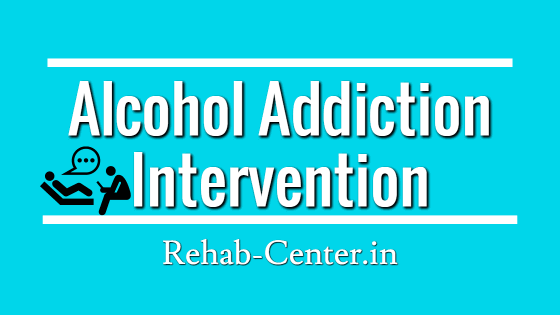Dealing with a loved one’s alcohol addiction can be as frustrating as it is painful. While some addicts only need a little nudge in the right places to accept treatment, others are extremely difficult to convince that they need professional help.
Intervention can be a very powerful tool in either situation, but you need to get it right, otherwise you risk alienating your addicted loved one and making treatment an even tougher task.

The Categories of Professional Alcohol Addiction Intervention
There are four main types of alcohol addiction interventions that are common and recognized by addiction professionals worldwide. Before exploring these intervention methods, you need to have some background knowledge to determine what may work best in your situation.
All interventions fall under one or more of three categories namely:
Direct intervention – Carried out by the loved ones of the addict with the presence, supervision and participation of an addiction or intervention specialist. This is found and widely accepted to be the most effective.
Indirect intervention – Carried out by the loved ones of the addict after being prepared by addiction or intervention specialists. There is usually no direct involvement of the specialist with the addict in this case.
Forced/Forcible intervention – Carried out forcefully or without the consent of the addicted loved one.
Deciding on an Alcohol Addiction Method
Normally, you may decide on the intervention method to apply based on the severity of your loved one’s addiction, but there are other things to consider very carefully such as:
[su_list icon=”icon: check-square-o” icon_color=”#0e5a15″]
- The personality, attitude, and mentality of your addicted loved one.
- Your personal abilities such as patience, handling frustrations, etc.
- Your relationship with your addicted loved one, especially prior to their addiction.
[/su_list]
You will discover how all of these apply as we explore the different alcohol addiction interventions.
The Main Types of Alcohol Addiction Intervention
Crisis Intervention – When you find that your addicted loved one poses an immediate and serious health and safety risk to themselves or to others around, a crisis intervention is necessary.
For example, and as if often the case, an alcohol addict may have high tendencies of suicide, mental illness, or severe physical illness.
Crisis intervention is often a direct intervention where the addict agrees to treatment. Where this fails, the intervention may be done without their consent to avert danger, making it a forcible intervention.
Notes: When crisis intervention is forceful, it is important not to alienate your addicted loved one as this can make treatment harder. Once they have been committed to treatment, be sure to provide extensive love and support for them.
Help them understand that your actions were borne of love for them. Getting counseling from an addiction counselor is very vital here.
Confrontational Intervention – This is a direct alcohol intervention where an addicted loved one is confronted and made to understand that their addiction is no longer tolerable. Usually, the addict will be told how their addiction has impacted the lives of the people involved, and then charged to sort their mess out via treatment or face punishment of some sort.
This is a very delicate intervention method and is carried out in the presence of an interventionist.
Here are some things to note:
If your addicted loved one is naturally very sensitive or tends to have a “me vs them” mentality, it is best to avoid confrontation.
If you find it hard to keep your cool under pressure or tense moments, you may say the wrong things when your addicted loved one resists direct confrontation. This can undermine the intervention. Direct confrontation is best carried out by people who are close to the addicted loved one as they have more right to make demands, in the eyes of the addict.
Johnson Intervention – This indirect method stems from the confrontational model, but it is private and less confrontational. An interventionist educates the loved one who then confronts the addict. In this scenario, you as a caregiver will be having a structured (often rehearsed) conversation with your addicted loved one, making them realize the effects of their addiction and why they need treatment.
Johnson intervention looks to appeal to the sentiments of the addicted loved one and works best where the intervening party is close to the addict.
There are major problems with Confrontational and Johnson interventions some of which are:
1. The addict’s loved ones may be uncomfortable with confrontation. This is especially true where they have enabled the alcohol addict in the past and struggle with guilt.
2. When used exclusively, these methods have no clear productive line of action in case of failure. The result is usually carrying out the punishment/threat, which often makes matters worse.
Recommended Article: What are The Twelve Steps of Recovery?
ARISE Intervention – This is a wholesome intervention approach (direct and indirect) and has been reported to have an average success rate of 83%. A Relational Intervention Sequence for Engagement (ARISE) eliminates the chances of rejection by the addict because they are aware, and often involved in arranging the intervention.
In ARISE intervention, the entire family or involved loved ones are counseled on managing the addiction. This is especially important where the addict’s situation has caused hurt or other emotional damage to the family.
ARISE is based on emotional motivation instead of confrontation, which may account for its high success rate. But there are exceptions:
1. It may not be effective on people who are far gone in their alcohol addiction and are mentally or emotionally incapacitated to participate in such interventions.
2. ARISE is unlikely to work on addicts who naturally require shock of some form to take action.
It is always important to pay attention to the personality of the addicted loved one as it goes a long way to determine the success of the intervention.
There are other intervention methods such as tough love, love first and family intervention. They are some form of confrontational, Johnson and ARISE interventions and can be direct or indirect.
One important thing to note with any form of direct intervention is that the addicted loved one may not welcome outside intervention, especially if they are naturally private or egotistical. Take care not to defeat the aim of the intervention by not paying attention to the personality of your addicted loved one.
Alcohol addiction intervention works more often than not with the right approach and with professional help.
Article source: Addictionhelper.com / UK-Rehab.com




We should not judge a person who has an alcohol addiction but instead, we should help them to recover. Rehabilitation is the best solution for them.
Well said Aryan.
Prapti Welfare Society is a Non-Profit Organization offering Drug and Alcohol Addiction treatment services as well as treatment to the mild psychological issue. Visit us at: Addiction Treatment Center